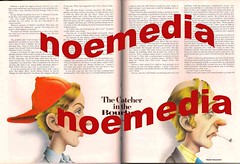This parody of "Catcher" by Bill Majeski is a case in point. And then there is the cover story by Nat Hentoff on Lenny Bruce and a nice article on Miles Davis, bebop and new jazz by moi.
I've created a deluxe limited edition, signed and numbered, of this Salinger tribute. It's a collector's edition, based on a facsimile of the original, printed on TWO SHEETS OF 11" x 17" PREMIUM CARD STOCK.
Please contact me at noemedia@pacbell.net and I will send you info on how to get one.
This is a parody published by College Monthly October 1974.
© 2010 noemedia.
© 1974. All rights reserved under international conventions. No material may be reproduced without written permission of the publisher.

Cover photo by Basil Pao
With retouching by Rainbow Graphics, body by Doug, hand by Noë of New York. T-shirt by Harry Gross; photo by UPI, lighting by Chris Callis, and body English by Tom King.

